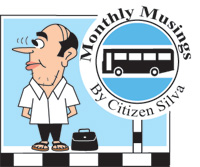Sunday Times 2
Vaccine: A chat with the doctor
View(s): Last month I received my first dose of the COVID vaccine.
Last month I received my first dose of the COVID vaccine.
Despite the dire warnings of those of my colleagues and acquaintances who derive all their scientific information from Facebook, Twitter and similar social media platforms, I suffered no serious adverse effects – apart from a little soreness at the site of where the injection was given into my upper arm.
I was discussing this matter of COVID vaccination with my good friend Charaka – a senior and well qualified medical doctor who, although now retired, still keeps himself up to date and is well informed about matters medical and non-medical. Like me, he is in his early eighties and took the vaccination himself on the same day that I did.
“You see, Silva” he said as he poured us each a beer, handed me my glass and sat down in his armchair opposite me, “what we all need to accept is that this COVID virus is going to be around for a while more – and just because we have taken the first dose of the vaccine does not mean that we are prevented from catching the virus”.
When one gets properly vaccinated against a disease like smallpox or polio, he explained, one becomes completely immune to that disease. With COVID, however, what the vaccination does is that it ensures that if you do catch the virus, you will only experience some mild symptoms (or even no symptoms at all) although the virus can continue living in your nose and throat. COVID vaccination prevents a vaccinated person from getting severely sick with the virus rather than preventing that person actually catching the virus.
I am told that up to date almost one million folk in Sri Lanka have already been vaccinated with the Astra-Zeneca vaccine, with the second dose scheduled to be given three to four months after this first dose. There being several thousand Chinese nationals living in our country, we are informed that they have been given the Chinese made Sinopharm vaccine (which some say is less effective than the Astra-Zeneca vaccine). The Astra-Zeneca vaccine manufactured in India which all of us received may no longer be available for us since India is having such a massive problem now trying to control its own COVID pandemic — and needs all the vaccine doses it can produce. However this particular Astra-Zeneca vaccine is being manufactured in many countries and so it should not be impossible to procure adequate doses for Sri Lanka to continue implementing our own vaccination programme.
India is experiencing a massive second wave of COVID infections – precipitated no doubt by people in that country letting their guard down, blissfully attending weddings, social gatherings, cricket matches, political rallies and religious festivals without observing any masking or social distancing. There has also been a slowness for various reasons in accepting vaccination.
This week, they were told that, starting from May 1, all adults over 18 will be vaccinated in a liberalised and accelerated Phase 3 programme.
“The truth”, observed Charaka, “is that there is so much about this COVID disease that we do not know. There are many things we are now confident that we know, there are many things that we have to acknowledge that we know we don’t know – and there are even some things that we don’t know yet that we don’t know properly!
“It is an evolving and changing situation – and we are learning about COVID and how to deal with it, as it were, on the job.”
He then went on “As for this story of blood clots associated with the vaccine — you have less than a one in a million chance of getting a life-threatening blood clot after receiving the vaccine — while an unvaccinated person has a more than a one in a hundred chance of dying if they catch the COVID virus. I believe this clotting only occurs in people who have a rare genetic variation – but, of course, we have not yet identified what that genetic variation is!”
So what all of us need to know now is that we should take the vaccination as soon as it becomes available to us, make sure we get the second dose at the appropriate time — and continue with the standard common sense measures like hand washing, wearing masks and social distancing.
COVID, I realised, is not going away in a hurry — and it is going to be around for a long time more.


